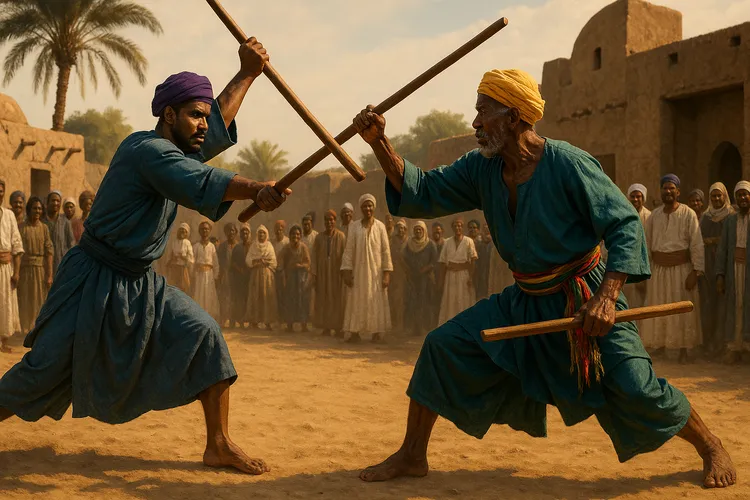Nubian Tahtib

Nubian Tahtib is a regional variant of traditional Egyptian stick fighting rooted in the Nubian communities of southern Egypt and northern Sudan. Distinguished by faster footwork, spinning tactics, and a looser, more mobile fighting stance, this style reflects both martial functionality and cultural expression. It is practiced in community gatherings and local festivals, often with competitive yet highly respectful intent. While closely related to other forms of Tahtib, the Nubian version is visually and rhythmically distinct, emphasizing speed, evasion, and celebratory athleticism. Nubian Tahtib is not only a martial form but a living symbol of Nubian identity and resilience.
Nubian Tahtib Essentials
About Nubian Tahtib
Explore Nubian Tahtib — a fast-paced, mobile stick fighting art rooted in the Nubian regions of southern Egypt, rich in culture and agility.
Nubian Tahtib History
Learn how Nubian Tahtib evolved from regional self-defense and warrior dances into a distinct form of cultural martial expression.
Philosophy & Approach
Understand the emphasis on respect, movement, and rhythm — where victory lies in grace, adaptability, and community connection.
Techniques & Style
Discover foot-switching, circular dodges, counter-spins, and reactive stick maneuvers unique to the Nubian interpretation of Tahtib.
Traditions & Etiquette
Study local customs like honor greetings, spontaneous circle matches (halkat), and the communal nature of performance and challenge.
Uniform & Symbols
See the vibrant Nubian garments, lightweight sticks, and traditional head coverings used in matches and public demonstrations.
Weapons
Nubian Tahtib centers around a thinner, flexible stick often carved from palm or tamarisk wood — ideal for speed and flow.
Ranking System
Explore how informal ranking arises through community reputation, demonstration of skill, and success in local mala’eb gatherings.
Nubian Tahtib Glossary
Learn essential terms like khashaba, halkat tahtib, ramya, and nagm el sa’eed — each tied to regional technique or tradition.
Notable Figures
Meet local masters, cultural ambassadors, and youth leaders keeping Nubian Tahtib alive in Aswan, Luxor, and the broader diaspora.
Branches & Organizations
Discover cultural collectives and youth centers dedicated to preserving Nubian martial identity through teaching, archiving, and festivals.
Competitive Format
Learn how Nubian Tahtib is practiced competitively through informal circle bouts, public exhibitions, and celebratory contests of skill.

